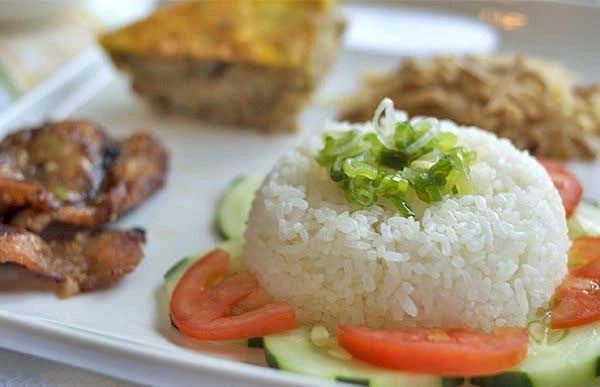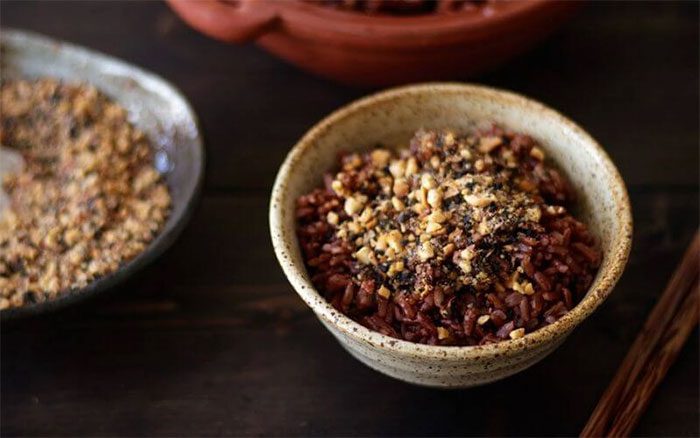Associate Professor Dr. Nguyễn Duy Thịnh, former lecturer at the Institute of Food Technology and Food, Hanoi University of Science and Technology, addresses whether one should eliminate rice to lose weight and how to consume rice to avoid weight gain.
In a country with abundant rice production like Vietnam, white rice, noodles, and pho have long been staples of the diet. They are not merely filling foods but also carry significant cultural identity.
Recently, a popular TikToker and Yoga coach with over 357,000 followers sparked controversy online by stating: “No rice because it can easily cause weight gain and is not good for health.”
“What’s so tasty about rice? It’s just white and turns into sugar.”
In a video, this TikToker mentioned: “… I don’t eat rice. You know, I don’t see what’s so tasty about it; it’s just white and turns into sugar. You know, foods with darker colors are better; they help with slower digestion.”
Additionally, she claimed that eating white rice is not good because it is absorbed quickly and can lead to weight gain. Furthermore, according to her, the habit of eating white rice is “because my parents did, so I got used to it, but actually, you can do without rice; it’s fine. Eating enough vegetables and a piece of fish is sufficient to feel full and nourished for the whole day.”
Besides discussing white rice, this popular TikToker also mentioned that she often eats dark-colored vegetables because they are better than light-colored ones, as the darker ones contain more nutrients.
The video has received many mixed comments. Many viewers are uncomfortable but also confused about whether white rice could be harmful to health.
Experts Alarmed by the Advice to Eliminate White Rice
Associate Professor Dr. Nguyễn Duy Thịnh, former lecturer at the Institute of Food Technology and Food, Hanoi University of Science and Technology, clarifies whether one should eliminate rice to lose weight and how to consume rice to prevent weight gain.

Associate Professor Dr. Nguyễn Duy Thịnh.
There are many rumors that “Eating white rice can cause weight gain and is not good for health; just eat vegetables and meat, and that’s enough.” Is this true, sir?
Not at all! In a meal, it is essential to ensure four groups of nutrients: Carbohydrates from noodles and rice; Fats from oils, peanuts, and sesame; Proteins from meat and legumes; Fiber, minerals, and vitamins from fruits and vegetables.
According to nutritional formulas, carbohydrates should account for 45-55% of a meal. Meat should make up about 15-25%. Fats should not be consumed in excess, ideally around 10-15%. The remainder should be vegetables.

Eating too much of anything can lead to weight gain, not just white rice.
This indicates that a meal is a combination of many components. It requires balance; nothing should be consumed in excess or too little. Eating too many vegetables or meats is also incorrect, as it can cause bloating and indigestion.
Eating too much of anything can lead to weight gain, not just white rice. Therefore, rice consumption should align with one’s physical condition and activity level; one should not skip rice to lose weight.
It is essential to understand that white rice converts to sugar but also provides energy for the body. This is particularly necessary for studying and working. Skipping rice can lead to nutritional deficiencies and lack of energy. Even walking or cycling requires energy. Not eating rice can cause sleepiness and a lack of vitality due to insufficient oxygen for the brain, especially in the morning.
– What about replacing white rice with brown rice? Is it better for the body, expert?
Nowadays, many families choose to eat brown rice because it is unrefined and retains a high fiber content. However, eating too much brown rice is also not good because it can lead to an excess of vitamin B1. Consuming too much can cause indigestion and bloating.
On the other hand, eating too much highly refined white rice is also not good, as it can lead to a deficiency of vitamin B1, causing beriberi (a condition marked by weakness and nerve damage).

Eating too much brown rice can lead to an excess of vitamin B1, causing indigestion and bloating.
Therefore, in my opinion, one should not eat too much of any type of rice but should combine them. You can have a few meals of brown rice each week, while consuming white rice for the rest of the time.
– There are also rumors that “dark-colored vegetables are better than light-colored ones.” Is this true?
Vegetables are divided into two groups: leafy greens and root vegetables. Light-colored vegetables like cabbage and napa cabbage often have higher sugar content and fewer vitamins than dark leafy greens, which photosynthesize better. However, among white vegetables, there are root vegetables like radishes, which grow underground and are highly nutritious.

All types of vegetables are good for health.
Thus, don’t overemphasize that you should only eat one type and avoid another. Any vegetable is good for health, and you can still enjoy white vegetables as long as they are tasty.
– What should one consider when eating rice to avoid weight gain, Professor?
Don’t skip rice; instead, adjust your portion sizes correctly. Besides reducing rice intake, you can increase protein and vegetable consumption, and gradually, the body will lose weight.
You can also replace rice with corn, sweet potatoes, or cassava, as they have lower energy content than rice but take up more space in the stomach, creating a feeling of fullness. Additionally, remember to exercise after meals.
It is best for everyone to eat a balanced diet from the start to maintain their weight. Don’t wait until you gain weight to try to lose it, as weight loss is not easy, and being overweight can harm your health.
Thank you for your insights!



















































